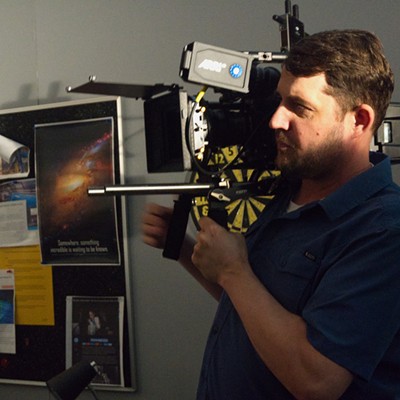Medea, presented by the Oklahoma City Theatre Company at CitySpace, is a perfect demonstration that no matter how much things change, they stay the same.
The play is a box-office smash from 431 B.C. and one of the most famous Greek myths, written by Euripides. Medea’s plight could be ripped, as they say, from today’s headlines.
Medea betrays her family and leaves her hometown of Colchis, where she was daughter of the king, for Corinth, where she is espoused to Jason (of Argo fame, seeker of the Golden Fleece).
She bears Jason two sons, but he jilts her for the daughter of King Kreon of Corinth. Jason observes that Medea becomes “raw with jealousy,” but this isn’t the common jealousy where one fantasizes about one’s ex-spouse “accidentally” getting run over by a chariot in a parking lot.
No, this is the festering jealousy that results in extreme despair and eventual destruction. Early in the play, we hear Medea wailing offstage. Before long, she enters and seeks seething revenge against Jason. When she invokes Hecate — the Greek goddess of the underworld and witchcraft, whose name appears frequently in Shakespeare — to help carry out her revenge, you know she means business of the most dire sort.
But first, she must charm Jason one more time to dupe him into her scheme of retribution.
When she does, he says matter-of-factly, “It’s natural for a woman to be upset.” A lot of the dialog has to do with how hard a woman must work to get and keep a man and how women aren’t much better off than slaves, which they weren’t in ancient Greek society.
Fabrice Conte directs the play, and he has staged a thoughtful, if humorless, production. Ancient Greek plays were more religious ceremonies than entertainment, and Conte’s blocking, use of the chorus, costumes and the actors’ painted faces are highly ritualistic.
J. Christine Lanning does fine as Medea. It’s a draining role. Lanning sustains her performance for the play’s intermission-free 95 minutes. Scott Hynes plays Jason as patronizing and devastated, all accurate emotionally. The chorus of Jennifer Casteel-Heideman, Krissy Jones and Rachel Morgan gamely carries much of the load.
Area theatrical artistic directors should take a look at ancient Greek drama as a source for revival and reconsideration (but no more productions of Lysistrata, please).












